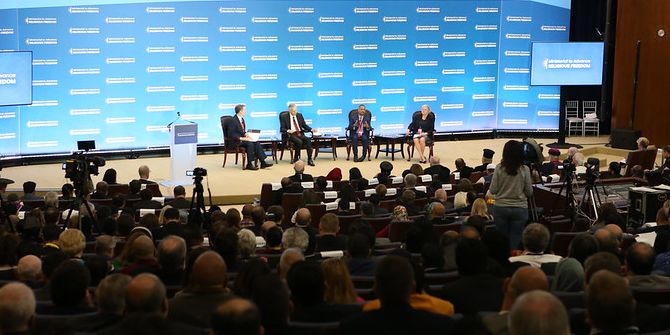Some incidents of racist abuse against Chinese people in the UK have been widely reported in the wake of the coronavirus outbreak. This has been no different for the Chinese Christian community, writes Yinxuan Huang. He has also observed how Chinese Christians in the UK have reacted to and internalised developments in China and Hong Kong. There has been solidarity with China’s whistleblowing doctors as fellow victims of Beijing repression, while coronavirus has also served to further stoke tension and resentment between Christians from Hong Kong and those from mainland China.

As a regular churchgoer, it is my experience that nothing in the past two decades has had a broader and deeper impact on the 100+ Chinese Christian congregations in Britain than the coronavirus outbreak. I recently reached out to 12 Chinese Christian leaders in nine cities (London, Manchester, Cambridge, York, Coventry, Bristol, Milton Keynes, Cardiff, and Edinburgh), including directors of national mission organizations as well as ministers and church leaders of local Chinese congregations, to ask them for their experiences, thoughts and insights on how the Chinese Church is coping with the coronavirus. Their answers, presented in three vignettes in this article, illustrate an unprecedented image in the history of Chinese Christianity in Britain.
The First Vignette: The Battle against the Coronavirus – and Racism
It strikes me that the Chinese Christian church was perhaps one of the first in Europe to react to the coronavirus. Most Christian leaders in Britain started communicating with colleagues across the nation and in other European countries regarding a possible battle against the coronavirus in mid-January 2020 – nearly two weeks before the first case was reported in York.
By the second week of March, most Chinese churches, particularly those in London, had taken proactive measures complying with NHS advice to prevent the spread of virus. These included moving Sunday services and other meetings online, updating news and information on their websites and social media, providing anti-bacterial hand wash and wipes on church premises, and tracing the travel history of participants and urging self-isolation as appropriate.

Apart from health and hygiene, the Chinese Church has been dealing with the issues of xenophobia and racism related to the coronavirus. The media has covered xenophobia and stigmatization experienced by Chinese living in Britain and members of Chinese congregations have indeed reported increasing levels of racial abuse, particularly in schools and in public transport. A few churches are now providing counselling and prayer meetings for those who have experienced racial discrimination.
“We feel an institutional response to racial discrimination is necessary. The media has reported some incidents. … But there are many more invisible cases here [in Manchester],” says an elder of a Chinese congregation in the city. “We are now organizing counselling sessions to support our members and meetings to teach young children and their parents how to get support from their teachers, school managers and the police.”
The Second Vignette: A Great Awakening?
The church leaders with whom I spoke agreed that the crisis is a great opportunity that has forced Chinese people, including themselves, to think twice about the role of Christianity in their lives and in mainland and overseas Chinese societies. Chinese preachers have been composing and revising sermons to teach their congregations about Christian responses to disasters and crises. Biblical messages regarding salvation, fear, and love have been shared repeatedly in the past two months.
For some, however, Christian faith presents not only an answer to the coronavirus, but also a way forward for mainland Chinese society.
When I asked my interviewees which event strikes them most, every single one of them mentioned the whistleblowing Chinese doctor Li Wenliang. His death was met with immense outrage and frustration across China and sparked an unusual demand for freedom of speech on China’s social media.

It is perhaps not unexpected that these Chinese Christian leaders, most of whom were born in mainland China, showed much empathy for Dr Li – his story triggered too many of their painful memories and their thirst for religious freedom. As a matter of fact, religious policy in the era of Xi Jinping’s rule has become even stricter. Over the past few years, the authorities have been trying to create a unique, “Chinafied” version of Christianity. Recently, hostility towards the Church has clearly risen with the implementation of a set of new Administrative Measures for Religious Groups and the sentences of prominent Christian leaders including Pastor Wang Yi.
Li’s death appears to have somehow activated these memories amongst Chinese Christians in Britain and motivated them to speak out for Christian values and religious freedom in mainland China. Importantly, an increasing number of non-believers have also started to advocate the role of Christianity in Chinese society.
“A number of newcomers in our fellowship said to me that they felt the Chinese society severely lacks virtues, social responsibilities, and civic-minded people,” a student fellowship leader in London told me. “And after they read an article about Christians sharing the love of Jesus in a coronavirus hot zone, they started to believe that Christianity is the cure.” He continued, “That moment, I understood why the Bible says we are the light and the salt of the world.”
The Third Vignette: Divisions and Paradoxes
After the first case of coronavirus was reported in the UK, and before the nationwide lockdown was imposed earlier this week, the Chinese Church was immediately struck by a dramatic two-week-long shrinkage in attendance. Church members were forced to choose between the congregation and security – sadly, they simply cannot coexist. Although more and more people came to refill the church since mid-February, about 50 to 60% of regular participants still chose to stay away from Sunday services.
The coronavirus crisis is also revealing a deeper crisis within the Chinese Church in Britain.
Confrontations between Hong Kong-born Christians and their mainland Chinese peers became much more visible during the 2019-2020 Citizen Amendment Bill protests, when intense political arguments between pro-democracy Hong Kong members and mainland Chinese members became common and soon led to cold wars within congregations.
Paradoxically, notwithstanding greater demands for freedom in both mainland China and Hong Kong, the coronavirus has not helped to reconcile the relationship between people from the two groups. Rather, it has created new sources of tensions, especially across the church’s younger generations. While Cantonese-speaking Christians tend to accuse the Chinese government of being inhumane in its measures to contain the coronavirus, many Mandarin-speaking Christians often criticize their views for being extreme and overkill and tend to quote Romans 13:1-7 as biblical support for submitting to governing authorities.
Ten of my 12 interviewees have witnessed arguments in person or on social media. In the past two months, collective activities in response to the coronavirus have only rarely merged the two sub-congregations. The clash between political values has been elevated by the coronavirus and continues to tear the Chinese Church apart.
“I have been in a difficult position because both sides wanted me to support their [political] views,” a Norwich-based minister said. “Even in their prayer meetings, Hong Kong members would pray only for the wellbeing of Hong Kong, and Chinese members would only pray for the wellbeing of China.”
The coronavirus pandemic is silently upending religious life as we know it. These three vignettes of the Chinese Church illustrate that the coronavirus may have an immense impact on every aspect of religion: numbers, faith, organization, culture – the list goes on and on. The Chinese Church offers only one facet of a potentially significant religious change amidst the pandemic. As the coronavirus has become a global issue, its reshaping of religious landscapes in different parts of the world deserves more attention.
Note: This piece gives the views of the author(s), and not the position of the LSE Religion and Global Society blog, nor of the London School of Economics.






Have Christian Chinese people any views on the source of the pandemic? This is the brutal and cruel treatment of animals. I recognise that after the 1970s, China was desperate to recover from famine. However, it appears that the inhuman attitude of Chinese governments has produced a total disregard of animal welfare and animal rights. The grievous ill-treatment of wild and farmed animals for food is the reason that this virus has crossed over into the human world. This is how far we have come from the Garden of Eden. The Bible will teach the Chinese Government and the Chinese people that each individual is precious and equal and that animal deserve to be loved, valued and given dignity.